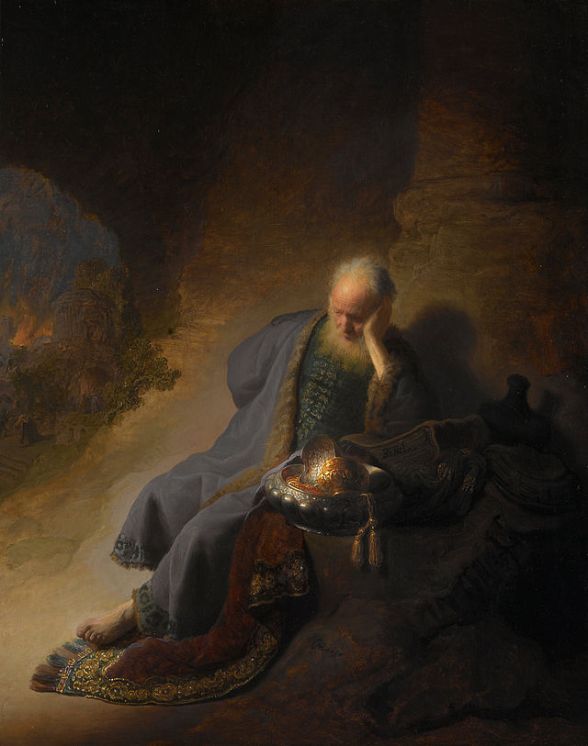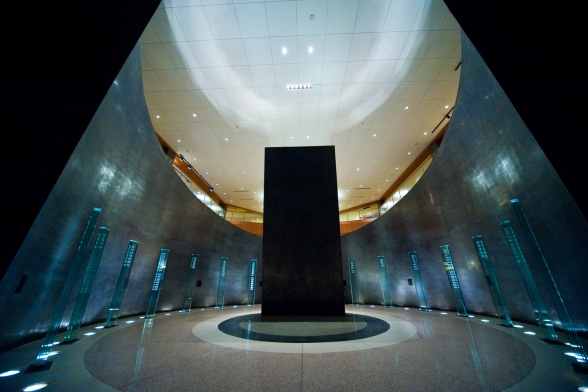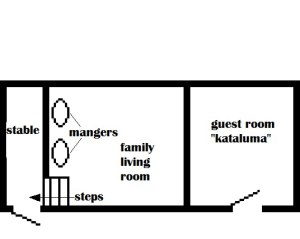(Something a little different. I have been dabbling with short (and longer) fiction. This is a short story I wrote. Comments and critiques in the comments section, please.)
“Forty-three years is too long to live a lie,” murmured Birdie Lewis as she clutched the letter to her chest again. She looked at her watch, Frank’s sensible 40th anniversary gift to her. Late. It was only a couple hours until Frank’s surgery. The doctor had told them to prepare for the worst. The cancer might have spread.
Sighing, Birdie looked away from the watch to the letter once again. Birdie could not imagine anything worse than what she should do now. She should have been at the hospital already, but she was lingering over the letter again — just one yellowed page with a well worn crease in the middle. Though she knew every word by heart, she kept it in the guest bedroom tucked away in an unmarked box among the flotsam of over forty years of married life. She moved the box every few years to keep it from being discovered. Yet she could always find that box and its illicit treasure without any incriminating illumination. Just like so many lonely nights, she was whispering Randall’s words as she cradled the letter to her chest.
She lifted the letter to her face, breathing in its comforting mustiness again. Here was tangible evidence of real love. It was not like the vicarious flings her friends found in romance novels or daytime dramas. This was no author’s fantasy or excuse for detergent commercials. After another caress and a sigh of resolution, Birdie tucked the letter into her purse. This time the letter was not going back into hiding. She couldn’t believe it was making her late again.
Birdie was really Bernadette. It was her younger siblings who unknowingly contorted her classy, given name to the silly nickname. The mistake stuck. Her small-boned frame and somewhat beakish nose contributed to its staying power so much that she finally accepted the moniker in grammar school. She became Birdie.
Settling into her car for the short drive to the hospital, Birdie looked in the visor mirror. She was still surprised by the aged woman who looked back. Without the mirror’s silent honesty, she saw herself the way Randall would have: young, vibrant, and hopeful. This older woman was still neat and proper, though she blamed guilt for pulling down her thin shoulders. She lifted them and forced a smile. Though her chestnut hair had grayed and her skin had loosened, Birdie still saw evidence of the younger beauty that attracted Randall and Frank.
Back then, Frank Lewis and Randall McIntosh were just boys from town, a year or two older than she was. Birdie considered them both beaus, but not serious contenders. They were all too young to be serious. Then came the war. Frank and Randall both volunteered and were eventually sent to the South Pacific, ending up in the same Marine unit.
Private Randall McIntosh wrote letters to her often. They were not seriously romantic or even serious about much of anything. He complained about endless drill exercises and bad food. He shared the newest jokes and excused the grown-up vices the boys took up to pass the time. Birdie was excited to get news from a real Marine, though any mentions of his location were callously blacked out by the censors. However, Birdie knew she was not the only recipient of Randall’s written attentions. He wrote to at least a few other girls in town. He was lonely and wondered why he was involved in this crazy war at all. Birdie supposed he yearned for return mail, care packages, and a passionate homecoming with someone. She willingly provided the first two and pondered the third.
Though Frank had dated Birdie a few times before the war, he had not written to her or anyone outside his family that she knew about. He was a man of few words. Randall wrote about him, though. He and Frank were constant companions through the rigors of boot camp and the battle in the Pacific.
A year went by and Randall’s letters waned with the apparent increase in his combat engagements. Birdie kept writing, though, imagining more romance than Randall actually promised. Love was easy when you could just erase words and start over. Birdie was so excited when the last letter came. She hadn’t heard from Randall in weeks. She tore it open and read:
Dear Birdie,
I am so sorry. I have not been serious with you. Now, I have gone and gotten myself shot fighting on one of these islands. I am lying here in a field hospital. It’s bad. The doctor told me I lost too much blood. This is probably my last letter.
Birdie, hon, I wanted you for my wife. I wanted to come home, sweep you up and whisk you away. Then we could get married, have some kids, and grow old together. But it seems the good Lord has other plans for me, now. Birdie, I love you and I hope you will forgive me.
Good bye, Randall
Birdie’s heart stopped and she slid off her bed to the floor. Why couldn’t she breathe? The letter was in a different, blocky hand from his earlier ones. Was this a joke or a mistake? No, Randall’s family got the dreaded telegram confirming the Secretary of War’s deep sympathy for the loss of their son. Apparently a nurse or chaplain had helped Randall spill his heart on the paper before the last of his blood did. Birdie thanked God for that nameless angel amanuensis. Without this letter, she would have never known the joy of shared love. But now, she was a widow before she even married.
Frank survived and returned from the war like many of the other soldiers, strangely older and harder. The world was a very different place now. Eventually he called on Birdie again. They dated quietly, calmly. His affection for her was sincere and tender. Privately mourning for Randall, Birdie numbly accepted his attentions. It was all she could think to do.
In September of 1946, Frank took her to the State Fair of Oklahoma in Oklahoma City. Thousands flocked to the renewed annual celebration. Frank and Birdie watched the rodeo events, ate corn dogs, and walked through the pungent farm animal exhibitions. As usual, Frank didn’t say much beyond what was necessary. As evening fell, Frank became even more seriously silent. He pulled Birdie to the ferris wheel. Uncharacteristically, he fidgeted while they waited in line. Finally they were ushered into their car and swept up into the deepening night. The fair lights glittered below as they neared the top of the ride. The voices below softened to a dull clamor occasionally punctuated by merry screams. Frank reached into his pocket.
“Bernadette, you know that I don’t say much. But this I have to say. I’ve seen war and death, and it ain’t pretty. Now, I’ve come home and I’ve found you. Actually, I think it was God that found you for me. I know I may not be all that you might dream in a man. And God knows you could do better. But, Bernadette, I want to spend the rest of my life with you. I talked with your father, and he approves. Will you marry me?” He held out a ring with a tiny, shiny diamond.
Birdie and Frank had reached the top of the ride. The ferris wheel paused to take on new passengers. Joy radiated up from the crowd, and the stars mirrored the happy glow from the lights on the ground. She should have been happy and excited. But, Birdie felt trapped. It should have been Randall proposing here. Tears gathered in her eyes as a dry wind picked up. Frank would think they were tears of happiness. She nodded slowly and took the ring. The ferris wheel rotated sending them down one stop at a time.
Now on the ground they headed for the exit. Frank was beaming. Had she really said “yes?” She looked at the ring on her finger. She put a hand over it. She hadn’t said anything, but there was no denying that ring. She had taken it from him. No one would be surprised. Most of her friends had already married during the summer. The whole world was settling down into a shell-shocked peace. This would be for the best, she decided. Passion was too painful and loneliness too possible. Frank would be a good companion who would treat her well. Surely, over time she would grow to love him like she loved Randall. A carnival barker beckoned her towards one of the games, “Try your luck here, little lady.”
Birdie the bride was thirty minutes late to become Mrs. Lewis instead of Mrs. McIntosh. She was dressed in time for the ride to the church. Everything was neatly packed for the day. But Birdie’s thoughts were anything but orderly. Randall was there, casting her carefully controlled emotions into chaos. She claimed to be nervous about her dress or the ceremony or something while she pushed her mother and bridesmaids out of the room. Brides could be forgiven for tardiness. Alone, she tried to pry Randall out of her heart so that she could marry with a clean conscience. She paced and fretted. She worried and prayed. In desperation, she gathered all the letters from Randall and threw them into the trash. All the letters except the last one. Daring divine judgment, she tucked that last letter into her right hand glove and went to the church. Randall, through his last letter, accompanied her down the aisle.
Pulling into the hospital parking lot, Birdie chided herself as she pulled out the letter again. After all these years, she was still chained to this letter and the dead man who dictated it. She read it again and wept and prayed.
“Dear God, What have I done with my life? I married Frank when I loved Randall. I let Frank think I loved him – all these years! Why didn’t you protect Randall? We would have been the perfect couple. So many times I asked you to clean my heart and help me forget about Randall. Yet, here I am. I have lied to my husband for forty years. I haven’t loved him as I should have. I never had the chance to love and be loved like it was with Randall. You gave Frank and me a great family and all these years together, but it wasn’t what I wanted.”
A younger couple walked by Birdie’s car. The woman’s head rested on the man’s shoulder as they slowly walked. What did they think of her? They must have seen her crying and punctuating her prayer with jabs and grabs of the steering wheel. But, they walked on, nursing their own griefs. Crying wasn’t too unusual at hospitals. Or they just didn’t want to get involved. No one really cared about her.
Birdie stopped. Ahead she imagined a very dark path. She didn’t want to keep going that way. Did she really think the world revolved around her problems? Birdie turned to watch the couple. She wondered what news they had received. The man reached up and smoothed the woman’s hair. The woman slowed and eased her head and shoulders even closer into him. His arm gathered her shoulders and bore them up. Birdie imagined a weight sliding from the woman onto his sturdy frame. He paused to take it on and straightened his back. This woman was not alone. “What a tender man,” Birdie thought. “He reminds me of …”
Frank! Birdie bowed her head again. “Oh, God! Have I missed your blessing all these years? Let me apologize before…” She couldn’t finish. God knew what she meant. Stuffing the letter back into her purse, Birdie got out of the car and headed toward the elevator. Was she really so blind?
Frank had always provided well for his wife and their three children, Amy, Joseph, and little Johnny. Though successful, he had not buried himself in his work as an accountant. He made time for his family. He was comfortable with numbers, but not with letters and words. Birdie adapted and had learned to understand him even from a single gesture. Frank became a deacon at their little Baptist church. He didn’t just take his family and then linger in the back chatting and smoking with the other men. He actually participated in worship and serving others. Frank loved His Lord and His church. Because of Frank’s genuine faith and commitment to his family, Birdie was the quiet envy of many wives, not that they would have admitted to such a sin. Frank was a great man and a good husband and father. How had she missed that?
Birdie was late again. Brides may delay weddings, but wives cannot delay death. She considered the possibility that Frank would be gone already. Perhaps gone forever. What if she never told him? Her need to confess welled up again. He had a right to know, and she needed his forgiveness. She quickened her pace. After an elevator ride and short walks through confusing corridors, she reached Frank’s room. She stepped in and her heart stalled. The bed was missing. He was already gone. She wouldn’t get to …
“Excuse me, ma’am,” said a soft voice behind her. “Are you Mrs. Lewis?”
Birdie turned and saw a young nurse. Birdie took too long considering the proper answer. Then she stammered, “Yes, Frank is my husband. Am I too late?”
“The doctor needed one more scan before the surgery. Your husband is pretty drowsy already, but he will be back through here in just a minute.” An uncomfortable pause. “Mrs. Lewis? I helped your husband write some letters this morning. He wanted to say a few things — just in case. He wanted you to write them, but… They are over there on the stand. The last letter is for you. You should read it.”
Birdie looked at the stand and its short stack of papers. Frank had probably written to each of their children and maybe the grandchildren, a momentous feat for her quiet husband even if he had been healthy. Birdie looked down at her hand. She hadn’t grabbed a tissue from her purse. She was clasping Randall’s letter. Surprised, she shoved it back down. Then she walked to the visitor’s chair and sat on its edge. She picked up the plain, white paper. The nurse’s hand writing was crisp and efficient.
Dear Birdie,
I am so sorry. I have not told you the truth. Now, I am facing this surgery. I am lying here in the hospital waiting for you. It’s bad, what I haven’t told you. But the doctor says now is the time. This might be my last letter.
I know about Randall’s letter. I know how you have gone back to it over the years. And I know what it says — because I wrote it! Randall didn’t make it to a field hospital. But he told me you were growing fond of him. I wanted you to have a special reminder of Randall. I was young and stupid. I didn’t know what pain my deception would cause.
I didn’t know that God had other plans for me. For us. When I came home, I realized that I wanted to whisk you away and marry you. I wanted us to have kids and to grow old together. And God gave it to us. I am so blessed! Birdie, I love you, and I hope you will forgive me.
Good bye, Frank
Birdie’s eyes brimmed with tears. All these years, all those tears, and it had been Frank’s letter! If only… She scooted into the hall, though her legs didn’t obey as quickly as the young ones she still imagined. She looked left and right. Where was the nurse? Then she saw Frank. His bed was being pushed down the darker end of the hallway toward the elevator. She wouldn’t get there in time. He probably couldn’t hear her, but she chirped loudly anyway, “Frank, I’m so sorry. I do love you!”
She stood clutching the pure, white paper in her hands. The yellowed, crumpled one fell from her purse unnoticed, fluttering weakly to the ground.
Frank slowly raised a trembling arm in a slow wave that Birdie, his wife of forty-three years, understood immediately – “I forgive you, my love.”
(If you liked this, I have one more published – “Mercy?” First line: “Today, Todd would face his wife’s killer.”)










